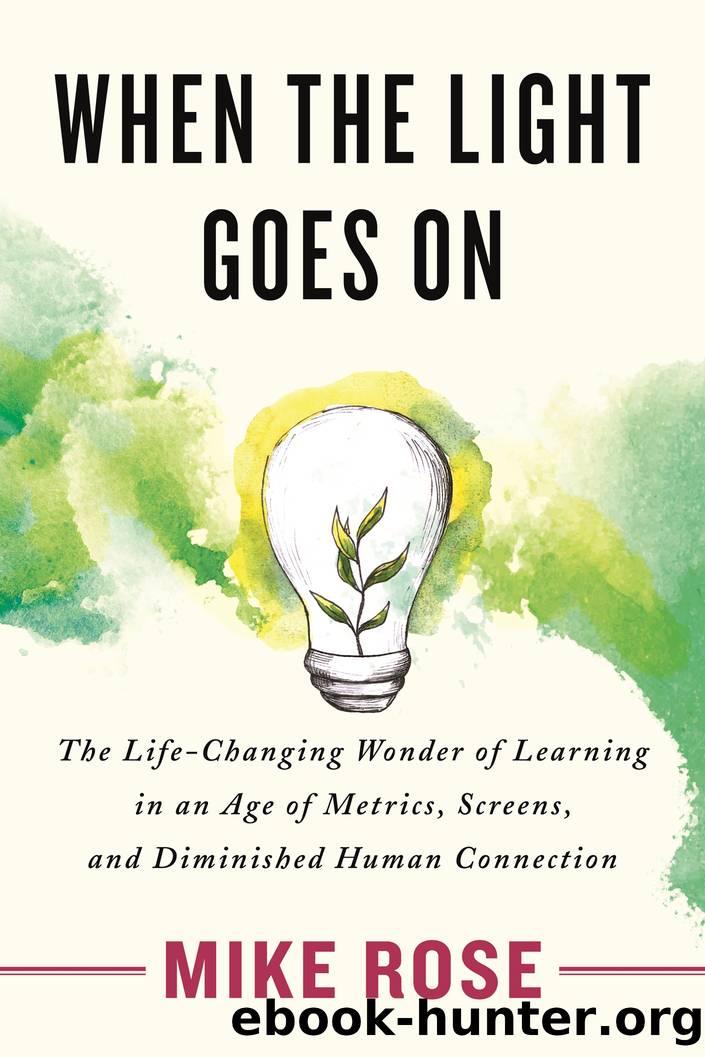When the Light Goes On by Mike Rose

Author:Mike Rose [Rose, Mike]
Language: eng
Format: epub
Publisher: Beacon Press
Published: 2022-03-15T00:00:00+00:00
One tragic fact about the path to academic achievement in the United States is that it is littered with barriers that have nothing to do with individual ability and effort or with the dynamics within oneâs family. As is the case with all our major institutions, the school absorbs the larger societyâs biases and inequities. Remember Tomás Herrera, the fellow I met in a universityâs student lounge reading Hegel who is pursuing a doctorate in political science? His account of high school contains both incidents of bias and person-to-person racism (such as his teachers ridiculing the clothing and hairstyles of the Mexican kids) as well as racist and classist structural norms and practicesâfor example, providing college counseling to students on the academic track while sending military recruiters to the homes of the other primarily working-class students. Other people of color I interviewed had similar stories to tell. Several spoke about not being guided to take honors or Advanced Placement classes, even though they had good academic records. One Latina explains that she succeeded by sticking close to her White girlfriend and taking the same courses she did. Assumptions were made by teachers and counselors about who would go on to college. âHow do you give a kid an A in math,â another woman asks rhetorically, âand not talk to him about college?â And sometimes bigotry is direct and nasty. A young Black man describes being ridiculed by his AP teacher for enrolling in the advanced class. âMan,â he says in exasperation, âit was all over by tenth grade.â
A widely held belief in our country is that once evident barriers to opportunity are removedâfrom segregationist restrictions to discriminatory hiring practicesâthen the playing field is leveled, and merit can triumph. To be sure, as social and state-sanctioned barriers are clearedâby social movements, by law, by evolving attitudesâopportunity widens. But bias and inequity die hard, are so embedded in our daily lives and institutions that they persist in many guises. Two further stories illustrate the shape-shifting persistence of social class and racial inequalityâand possible ways counselors and teachers can respond.
Kateri Allen was a model student. Her father was in the construction trades and her mother was a homemaker and volunteered at Kateriâs school. Of the five children in their family, Kateri was the scholar. âI wanted to make my parents happy,â and her achievement did just that. By the time she began her senior year in high school, she was an athlete and a member of the National Honor Society. She took Advanced Placement classes and was a straight-A student. Kateri was compiling exactly the kind of record that would open doors to college, to lots of colleges, and she was Native American, a group notably underrepresented in higher education.
The high schoolâs college counselor, Mr. Torres, was also Kateriâs Advanced Placement Government teacher, so fortunately, he knew her as a standout student. They meet at the beginning of the year in his small, cramped office for a mandatory check-in. What are your plans
Download
This site does not store any files on its server. We only index and link to content provided by other sites. Please contact the content providers to delete copyright contents if any and email us, we'll remove relevant links or contents immediately.
Harry Potter and the Goblet Of Fire by J.K. Rowling(3025)
Unfinished: A Memoir by Priyanka Chopra Jonas(2912)
Never by Ken Follett(2873)
The Man Who Died Twice by Richard Osman(2290)
Machine Learning at Scale with H2O by Gregory Keys | David Whiting(2269)
Fairy Tale by Stephen King(2059)
Will by Will Smith(2033)
Rationality by Steven Pinker(1761)
The Storyteller by Dave Grohl(1656)
The Dawn of Everything: A New History of Humanity by David Graeber & David Wengrow(1565)
The Dark Hours by Michael Connelly(1563)
The Stranger in the Lifeboat by Mitch Albom(1529)
Cloud Cuckoo Land by Anthony Doerr(1428)
The Becoming by Nora Roberts(1324)
Friends, Lovers, and the Big Terrible Thing by Matthew Perry(1324)
Einstein: His Life and Universe by Walter Isaacson(1312)
Crying in H Mart by Michelle Zauner(1312)
New Morning Mercies: A Daily Gospel Devotional by Paul David Tripp(1305)
A Short History of War by Jeremy Black(1295)
